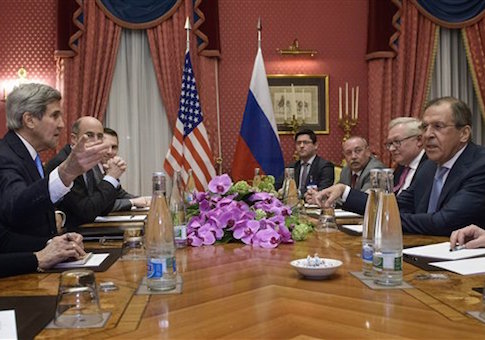LAUSANNE, Switzerland—Iranian negotiators are becoming rigid and unmoving in their stance on a range of key nuclear issues in talks, according to multiple sources familiar with the negotiations who said Tehran is angling to elicit as many concessions as possible from the United States as the talks reach a critical stage ahead of the looming March 31 deadline.
Iran is pushing for major relief from economic sanctions and the ability to continue sensitive research and development on the nuclear and weapons fronts, according to sources quoted in the Iranian state-controlled press on Sunday.
The Iranian side is said to be digging in its heels over these issues as U.S. diplomats rush to finalize a tentative agreement ahead of a self-imposed March 31 deadline.
"Sanctions and research and development are the areas where Iran and the G5+1 still have differences," one source close to the Iranian diplomatic team was quoted as telling Fars News on Sunday.
Western sources familiar with the U.S. stance confirmed the sticking points and told the Washington Free Beacon that the pressure from Iran is likely to force the Americans to offer more concessions on these fronts than have previously been on the table.
"The Iranians are again outplaying the Americans," said one source in Europe familiar with the negotiations. "They know they’ll have to give up certain things eventually. So they’re digging in their heels on issues that mean everything and preparing to give ground on relatively minor issues—but not yet, and not until they see how much more the Americans are willing to give."
Previous concessions by the United States appear to have motivated Iran to push harder on issues such as the possible military dimensions of its nuclear program, as well as continued work on advanced centrifuges and increased sanctions relief, according to a second American source apprised of the demands being set forth.
"Iran has successfully dragged the administration toward their positions to attain massive concessions, and, sensing that kind of weakness, they are seeking to press their advantage to gain further ground on critical points," according to the source, who added that on the sanctions relief front, Iran is seeking a rollback "without dismantling anything."
Javad Zarif, Iran’s foreign minister and chief negotiator, hinted at this position following a daylong round of intense talks with Western powers on Saturday.
"In negotiations, both sides must show flexibility. We have, and are ready to make a good deal for all," Zarif tweeted. "We await our counterparts’ readiness."
Observers on the ground also raised their eyebrows when a meeting between Zarif and representatives of world powers scheduled for Sunday afternoon did not occur. Following reports that Zarif would not appear, the meeting was nixed, according to U.S. officials.
Iranian diplomats have pushed back in harsh terms against reports that they may agree to ship Tehran’s stockpiles of enriched uranium to Russia. One member of the Iranian negotiating team who spoke to the state-controlled Fars news agency called these reports an attempt to "disrupt" the talks.
"Releasing such reports by the western media is in line with media hype to disrupt the trend of the negotiations which is, of course, a futile attempt," the Iranian negotiator was quoted as telling Fars on Sunday.
Iranian attempts to change key U.S. demands about the scope and size of its nuclear program come after American diplomats offered a range of new concessions last week aimed at softening Tehran’s stance.
Those concessions included rolling back demands that Iran be forced to disclose the full range of its nuclear activities at the outset of a nuclear deal and allowing it to run nuclear centrifuges at a fortified underground facility that is immune from air attacks.
Iran is now pushing to scale down the time limits of any agreement, according to the Associated Press. Iran is seeking to be allowed to ramp up its nuclear program after a 10-year period.
"The Iranians have a 100 percent record of getting the Americans to accept their key positions on centrifuges, heavy water, and ballistic missiles," said the Europe-based source. "They think the Americans want a deal more than they do. By all appearances, they’re right."
Frank-Walter Steinmeier, Germany’s foreign minister, warned on Sunday that there could be "further crisis in these negotiations" in the coming days, according to Reuters.
Meanwhile, Secretary of State John Kerry, when asked about the prospects of reaching a deal during a stop in a Swiss chocolate shop, responded "inshallah," which is Arabic for "God willing."
